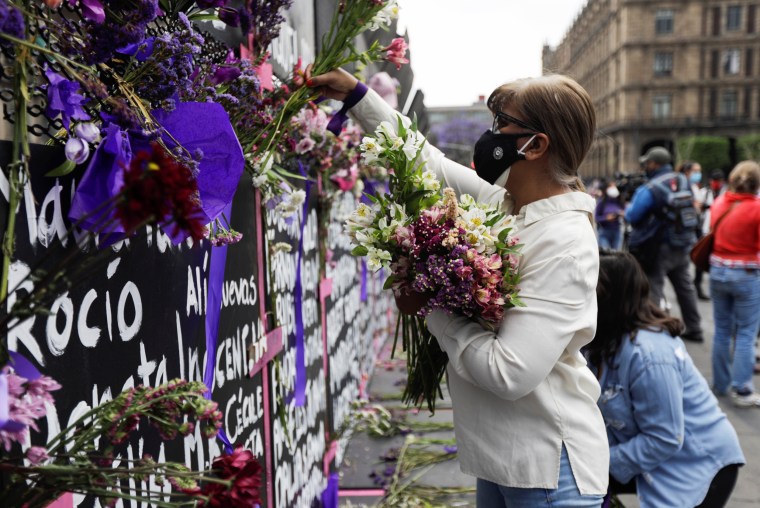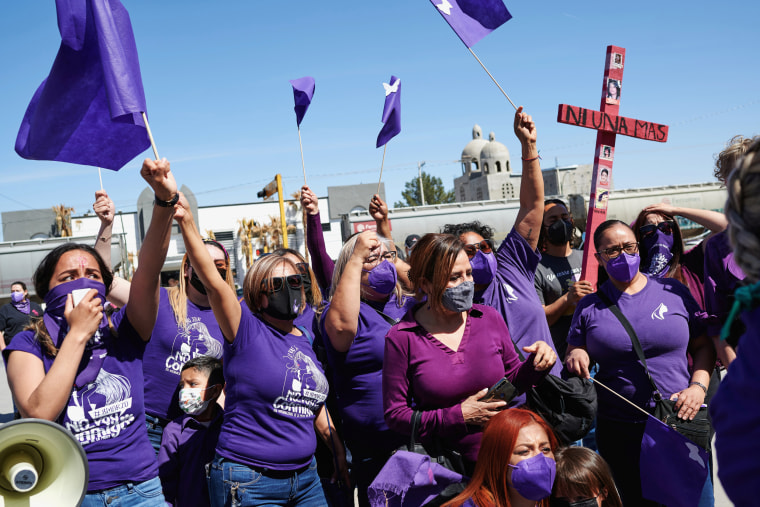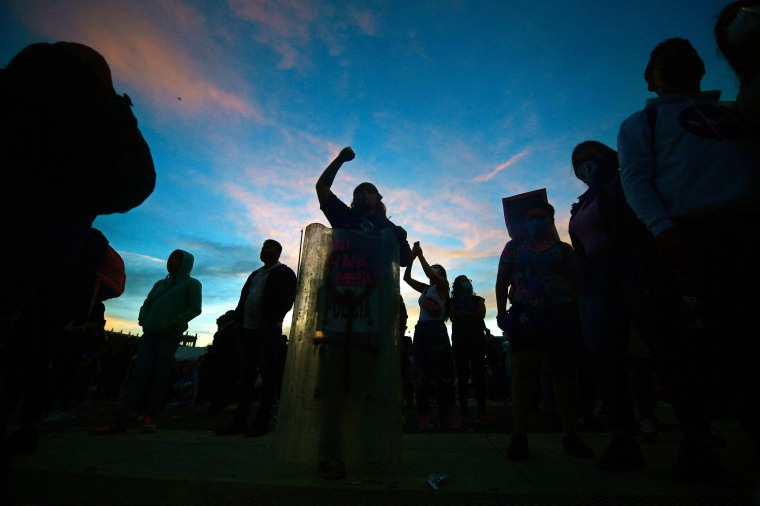MEXICO CITY — It was like being in a battle. People were running everywhere while shots were heard. Naomi Quetzaly Rojas Domínguez, 22, found herself running for her life in Cancún, wondering how a demonstration for women's rights and against femicide, or the intentional killing of women, had turned into an assault.
As the crowd around her was looking for a way out, she saw several police officers beating some teenage women. She ran toward the officers and screamed at them until they left the young women alone, who then fled in terror.
Next, the police officers turned their attention to her, and after beating her, transferring her and other protesters to the Municipal Palace, the seat of the City Council.
"They kept me apart for a moment," Rojas Domínguez said. "They finished beating me and sent me with the other girls. When I saw them, it was a horrible scene because they were all handcuffed, lying on the floor, in a corner. They took me with them, and that's when I was sexually abused by a policewoman."
She described what took place after she and others participated in a demonstration on Nov. 9, where civic and feminist organizations had mobilized to demand justice for the killing of Bianca Alejandrina Lorenzana, a 20-year-old girl known as Alexis.
Inside the official facilities, Rojas Domínguez tried to defend herself, but she said she was immobilized because of the handcuffs. The policewoman hit her in the face, pulled her hair and scratched her neck, while making fun of her. Then they began to transfer them without telling them where they were going.
“At that moment you don't even know how scared we were, because as a woman, you fear that they will rape you, that they will kill you. When they put me in the palace, I lived all my fears. There they raped me, they beat me and I felt like I was disappearing,” Rojas Domínguez said, recounting the events of last fall.
The cases of Rojas Domínguez and others are registered in a new Amnesty International report, "Mexico: The (R)age of Women: Stigma and violence against women protesters," that analyzes various human rights violations against protesters denouncing gender-based violence in five Mexican states last year: Guanajuato, Sinaloa, Quintana Roo, Mexico and Mexico City.
The report found that women who protested peacefully saw security forces violate their rights to freedom of expression and peaceful assembly. The women suffered unnecessary and excessive use of force, arbitrary arrests and even episodes of violence and sexual abuse.
“What we have found is that those who go out and march are seeking justice in cases of women who have suffered great violence either by the authorities or in the private sphere by their own partners. And these women find neither justice, nor truth, nor reparation when they go to the authorities,” Tania Reneaum Panszi, executive director of Amnesty International Mexico, told Noticias Telemundo in an interview.
In Mexico, protests against gender violence have increased from 2015 to 2020. At the same time, femicides under investigation have increased each year, from 411 in 2015, to 860 in 2020.
But these investigations are only looking at a fraction of crimes against women, according to groups including U.N. Women. In 2019, Mexico registered 971 alleged victims of femicide and an alleged 2,862 female victims of intentional homicides. Only a quarter (25.3 percent) of the murder cases were investigated as gender-related crimes.

The system is not prepared to adequately investigate and process crimes from a gender perspective, and there are many more presumed cases. Femicides only began to be officially registered in the National Public Security System in 2015.
“The women come out and protest angrily against the state because it's absent and it's not responsive. Anger has to begin to be seen as part of a process of social change," Panszi said, "and not simply as angry women protesting."
On Aug. 12, 2019, in Mexico City, women's groups demonstrated after two teens said they suffered sexual violence by city policemen.
The media did not focus on the attacks against the teens but on the protesters' use of slogans and the fact that pink glitter was thrown at an official, the report noted. Mexico City Mayor Claudia Sheinbaum described the protest at the time as a "provocation."
The comments led to another women's march on Aug. 16 and, since then, a wave of massive demonstrations calling out violence against girls and women and demands for an effective response from authorities.
The Inter-American Court of Human Rights has condemned Mexico for the much publicized rash of femicides in Ciudad Juárez in 2009, the rape of an Indigenous woman at the hands of the military in 2010 and, in 2018, for sexual abuse and rape against various protesters in the State of Mexico by members of the police forces.
'Which of these women ... will be able to trust a policeman?'
Amnesty International's investigation found that authorities imposed undue restrictions on the rights of protesters by designating as violent actions that are protected by the right to freedom of expression, such as painting slogans on public walls or modifying monuments.
Although the report clarified that the authorities can impose certain measures to prevent damage to public or private property, it points out that this should not restrict human rights or prevent peaceful demonstrations.
The report found police stigmatized and criminalized the behavior of women who covered their faces during protests, including masks to prevent contracting Covid-19, and women who dressed in black.
“We have to understand that the police in Mexico live in a culture lacking legality. If the police are capable of raping, threatening to disappear, threatening to forcibly undress, threatening massive rapes, it is because there is no consequences — no transparency in operations and operations," Panszi said. "Which of these women who were taking to the streets today and in the coming years will be able to trust a policeman from this country?"
María M. Ángeles, 27, an activist and single mother, said she lives in "hell" and said it's not an exaggeration, since the State of Mexico has been one of the most violent and dangerous territories against women. In 2020, it ranked first with 151 victims, and in January 2021 alone, 12 women had been murdered.
Ángeles knew at a young age that something was wrong in her house. “My mother was a victim of sexist violence by my father. ... He exerted all this violence on my mother and nobody said anything. Nobody got involved, they never came to help us and nobody ever bothered to ask us or to see what happened,” she said.
Growing up, she became a human rights activist and has participated in various protests, including one last September denouncing the way authorities evicted those who occupied the headquarters of the Human Rights Commission.

After the protest, Ángeles and other demonstrators, including children, were put in vans without any official logos, and officers did not identify themselves nor inform them where they were going.
When they reached the offices of the Public Ministry, Ángeles had to undergo a medical examination in the presence of two female police officers. In addition, the officer who transferred her also examined her.
"This is the tyranny exercised by the 'machista' state against us, as long as we do not claim what rightly belongs to us," Ángeles said. "This fight is going to take us many years. Maybe I won't see the results, but this is for everyone who comes after me and because there's no other way to live. In other words: It is to fight or die here in the State of Mexico."
A presidential disconnect?
Mexican President Andrés Manuel López Obrador has touted the quest for justice and equality as part of the guiding principles of his "fourth transformation." But he seems to be thrown off by women's rights movements and protests denouncing crimes against women.
Last week he told the press that he did not know what it meant to "break the patriarchal pact" and had asked his wife to explain it to him. He then described the phrase as an "expression that had been imported" and seemed to equate the calls for action denouncing violence against women with those who criticize women's groups.
The clearest case of the president's disconnect with the growing women's movement is his support for Félix Salgado Macedonio, a former senator who leads the polls ahead of the June gubernatorial elections in the state of Guerrero. Salgado Macedonio has faced three accusations of rape and multiple accusations of sexual abuse and harassment.
"We respect women a lot, we have always done it, we have defended women, we are pioneers in defending and respecting women," López Obrador said last week at his daily news conference, while continuing to defend Guerrero's candidate.
Despite his statements, high fences were installed before International Women's Day marches around the National Palace and other historical monuments on Friday. The president's communications coordinator, Jesús Ramírez Cuevas, called it a “wall of peace.”
The actions were swiftly repudiated on social media, and López Obrador justified the measure the following day: "There is going to be a demonstration of women. They have every right to protest, to demonstrate, but there is a lot of provocation. There are many people who infiltrate and what they seek is to cause harm. They use violence as a form of protest and throw Molotov cocktails, and we do not want any side to be injured."
The women reacted to the barrier by turning it into a vast memorial with the names of the victims and the unfinished cases. On Monday morning, the billboards were turned into a flowery wall filled with offerings, photos, banners and memorabilia of missing and murdered women across Mexico.
"Femicides have increased significantly in recent years, including during this government, and the president does not recognize it is complicated and worrying," said Guadalupe Correa-Cabrera, an associate professor at George Mason University. "The attacks against women and the violation of human rights are very important, crucial issues, and that is why they are demonstrating in the streets."
On Monday, marches and street actions were held throughout the country, within the framework of International Women's Day. In Mexico City, protesters denounced the repression by the authorities guarding the National Palace.
Tear gas and extinguishers were used repeatedly against people who gathered at the Zócalo in the Mexican capital. At the end of the day, authorities said there were 81 people injured: 62 police officers and 19 female protesters.
After more than four months and after numerous bureaucratic obstacles, Naomi Quetzaly Rojas Domínguez filed her complaint of sexual abuse by a police officer.
"This generation that is fighting may not experience all the rewards of the fight," she said, "but others will be able to, and with that I feel more than rewarded."
If you have information about cases of abuse against women in Mexico or Central America, you can write to albinson.linares@nbcuni.com.
An earlier version of this story was originally published in Noticias Telemundo.
Follow NBC Latino on Facebook, Twitter and Instagram.
